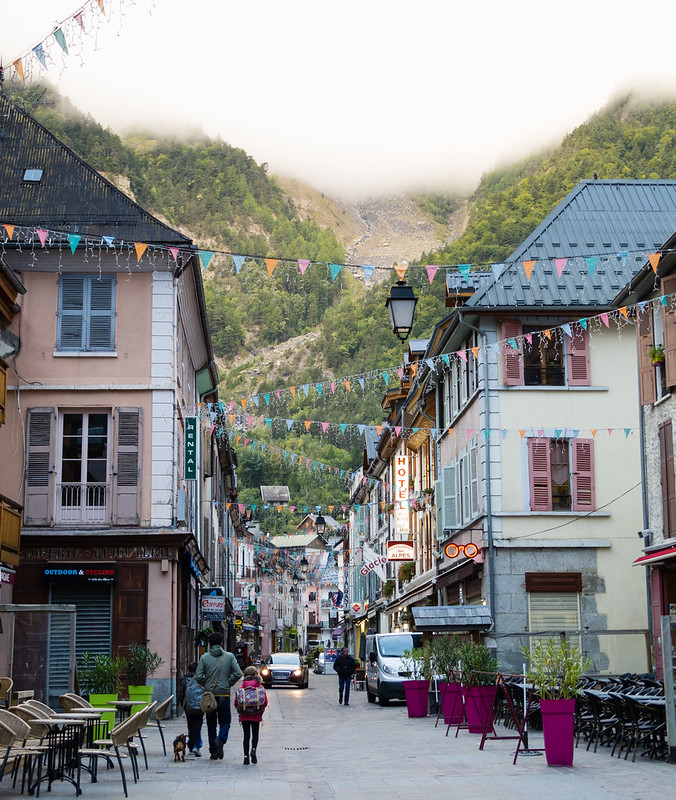I took the afternoon train to Grenoble and stayed in a hostel downtown. At dinner that evening I was exposed to raclette for the first time [Ed: I’m shocked that there isn’t someone in Oakland doing hipster raclette], but my stomach was still not great, so I had a light dinner and a light breakfast and hoped that I could consume enough on the road to power me up the mountain. The weather was iffy, with the high at the peak forecasted as 2º C. But I was here for an adventure, so off I went.
Unlike Croatia where every road was hilly, in southern France the terrain outside of the hills is relatively flat, so I was able to make some time. That was, until I made a bad navigation decision, winding up on the wrong side of the river on a pathway that turned from pavement to dirt. I should have turned around but looking at the topography thought the path must go through. Which was true, but the pathway deteriorated along the way, becoming unrideable, and then unwalkable.
I saw a more rideable path 10 meters lower on the hillside, but the slope was nearly a cliff. After a very sketchy operation which required balancing the back wheel of the bike on my head, I made it down to the lower path and got back to riding; I still had several Ks to get to the bridge back over the river. Eventually I hooked back up with the paved part of the route but the detour took a lot out of me in terms of energy and momentum. There was some fun riding on quiet roads, though.
The climb up to the mountains had more traffic than I had expected. Most of it had wide shoulders, but the high-speed traffic made it not particularly pleasant, though some of the side routes through the towns were nice. Traffic dropped off a little bit as the road started to climb more seriously, but it was still not a quiet ride. It was increasingly beautiful, though, as the cliffs rose around me and I the view started to reveal the high valleys and mountains.
The increasing struggle against the hill turned into a moment of despair when a rain squall with freezing wind blew in at the very moment when a sign seemed to direct me onto another terrible dirt road. There was no real shelter on the detour, so the best I could do was to stay under the trees for a while to let the worst of the storm by. After casting about for a while to see if I could continue up the dirt road, I realized the sign was indicating the end of the bike lane, not a prohibition on bikes on the highway. Frustrated but a bit relieved, I got back on the road.
Climbing up the valley, I felt strong at points but weak at others. I still couldn’t eat normally, so I was taking small snacks and sips of water as I could, and it got quite cold, single digit C temps with wind.
When I was feeling strong, I thought the way to attack the climb was just to roll straight up the mountain, but after I reached the high valley and saw more rain coming in, I decided I didn’t have it in me. I had been scheduled to stay in Le Bourge d’Oisans at the bottom of the climb anyway, so I decided to just go straight to the hotel and hit the mountain in the morning.
Daily musing: Reading signs
When looking at European road signs, sometimes a red line through the figure means “forbidden” (as in, “no bikes”), and sometimes it means “ending” (as in, “bike lane ends”). Misreading that sign caused me to waste a sizable amount of energy and time.
I’d also been misreading signs about roads and paths. The road I took this morning looked wide and inviting. I was sure it went to where I was going; a road which looked like that in the U.S. would have. But our reading of signs is connected to cultural assumptions, and those assumptions don’t work the same way in other places.
One of the reasons a trip like this is challenging is that all the signs are different. At home I can easily tell the difference between a fancy restaurant, a family joint, and a dive bar based on external signs; but here in Europe I didn’t always know what to look for. Human interactions are also thick with signs, and difficulty in reading the cultural indicators is part of what creates the feeling of being an outsider. Reading Camus’ L’Etranger, which I’d borrowed from my brother in Vienna, probably contributed to a feeling of alienation.






